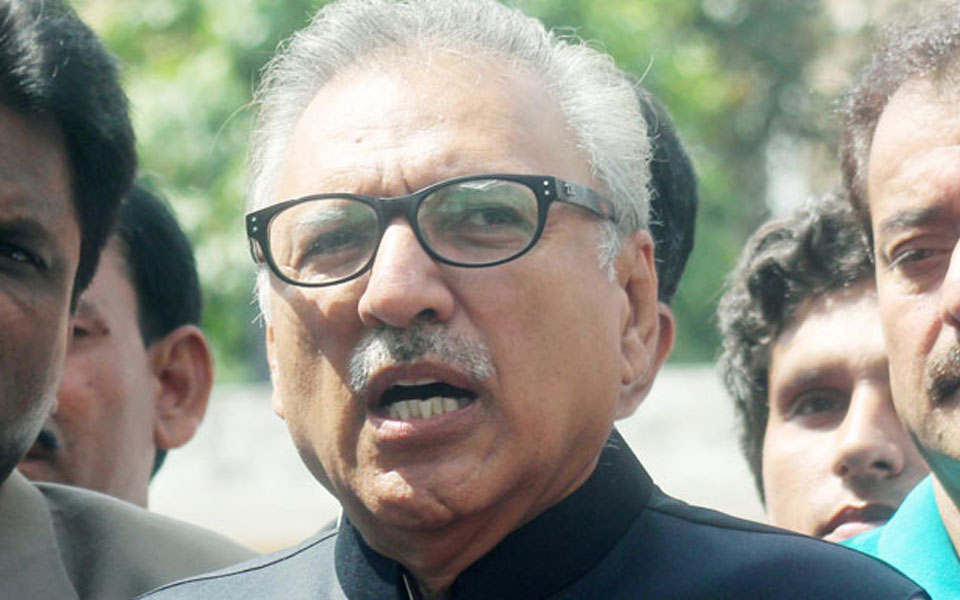Islamabad, Oct 28 : Pakistan President Arif Alvi on Sunday ruled out establishing any kind of relations with Israel as he strongly rejected reports that an Israeli aircraft carrying some officials secretly landed in Islamabad and flew away after several hours at the airport here.
"Islamabad is not establishing any kind of relations with Israel," Alvi told the media before his departure for Turkey on a three-day official visit in the wee hours of Sunday.
It all started when an Israeli journalist Avi Scharf tweeted on October 25 that an Israeli business jet flew from Tel Aviv to Islamabad where it was on the ground for 10 hours, before flying back to Tel Aviv.
Social media users took note and flayed the Pakistan government with the Opposition also joining in to demand an explanation about the "secret Israeli mission".
Foreign Minister Shah Mehmood Qureshi also dismissed reports of an Israeli aircraft landing in Pakistan as fake and baseless. Qureshi said that something which is not even real does not warrant a response.
Information Minister Fawad Chaudhry has also rejected the reports and said the "government would not negotiate in secret with either Israel or India".
He regretted such reports despite the fact that the Civil Aviation Authority (CAA) had also denied reports of the presence of any Israeli aircraft in Pakistani airspace or at its airports.
Pakistan Muslim League-Nawaz leader Ahsan Iqbal, who earlier led the Opposition's barrage, said Chaudhry's reaction showed the government was trying to hide something.
"The parliament should be taken into confidence over the issue," he demanded.
BBC Urdu reported that the aircraft in question was a Canadian-manufactured Bombardier Global Express with the serial number 9394. It was registered on February 22, 2017 in the Isle of Man in the UK by a company called Multibird Overseas Ltd.
The Israeli journalist later said he was not "100 per cent sure" if the plane had landed in Islamabad.
Pakistan and Israel do not have diplomatic relations and their aircraft are not allowed to use each other's airspace.
Let the Truth be known. If you read VB and like VB, please be a VB Supporter and Help us deliver the Truth to one and all.
Hyderabad (PTI): Telangana Chief Minister A Revanth Reddy met Union Home Minister Amit Shah in Delhi on Wednesday night and urged him to increase the sanctioned strength of IPS officers to the state in view of its growing administrative and security needs.
The two leaders also discussed the recent surrender of several senior Maoist leaders before the Telangana Police and other issues.
"During the meeting, the two leaders discussed the issue of Maoist surrenders and their rehabilitation. The chief minister informed Shah that significant improvements in policing have taken place in Telangana over the past two years," an official release here said.
Highlighting that 591 Maoists have laid down their arms and joined the mainstream of society during this period, the chief minister said the state government was providing them compensation and rehabilitation assistance as per the rules.
He requested the Union home minister to extend financial support from the central government for development works in the backward regions of the state.
Reddy also urged Shah to increase the sanctioned strength of IPS officers to the state from 83 to 105 in line with the state's growing administrative and security needs, the statement said.
The first cadre review after the formation of Telangana was conducted in 2016, while the next review, due in 2021, was delayed and finally carried out in 2025. Even then, only seven additional IPS officers were allocated to the state, the chief minister informed Shah and requested that the third cadre review be conducted in 2026 as per the schedule.
Reddy explained that Telangana, like the rest of the country, is facing several modern challenges, including cybercrime, drug trafficking, white-collar crimes, and other emerging security threats.
He highlighted the reorganisation of the Hyderabad, Cyberabad, and Malkajgiri Police Commissionerates, the proposed formation of the Future City Commissionerate and the rapidly growing population in Hyderabad to underline the increasing administrative requirements of the state.





